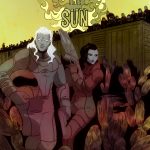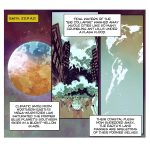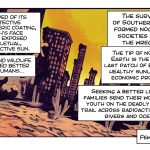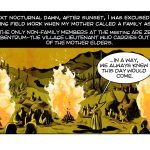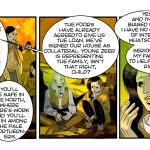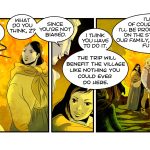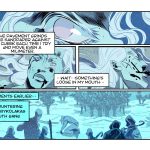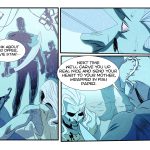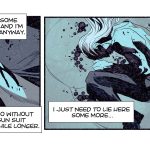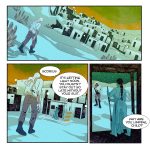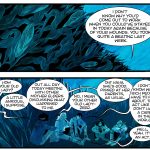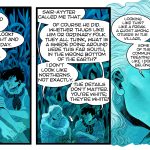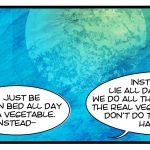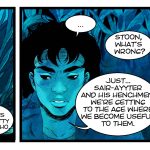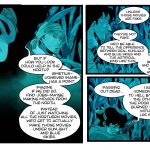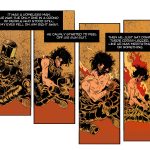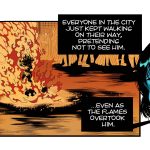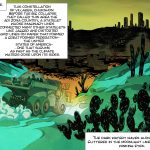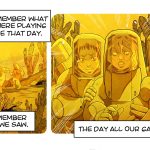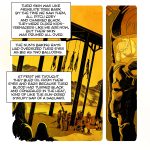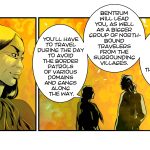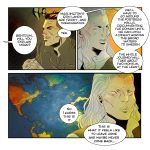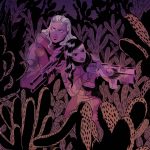Throw it in the forest before it starts to spoil.
Let birds shit it to obscurity.
It won’t be missed. Not by you and not
by the man on the train whose hand
you grabbed by accident. The lights flickered
and you let yourself get carried away by fear.
I don’t know you, the man said, excused
himself away from you. Everyone forgets eventually.
Even the boy whose disappointment you captured
on parchment paper and hung in your bedroom
for years. His body is far gone from your bed
and slowly yours will be too.
Think of it as an extended vacation,
a sweet Valium dream.
You’ll be reborn, a swamp-monster,
slick and diamond-tough.
You’ll tear into an avocado and eat it,
pit and skin and all. And you will have forgotten.
That’s the only way to keep living.
Tag: Hispanic Heritage Month
No te metas
As hard as she can, Griselda pinches the skin between her thumb and pointing finger. The pain is a distraction. Earlier today, her dad grabbed her heavy metal t-shirts, favorite black hoodie, and smelly socks and stuffed them inside a black suitcase. The suitcase now stands by the open front door, and Griselda can see her dad. He’s outside by the yellowing yard with his head tucked under the hood of a fender-dented Ford pickup. Griselda sits on the couch while her dad fidgets with Craftsman tools. He’s trying to get his truck started by working on the carburetor, which Griselda hopes he can’t fix.
Her mother left them eight months ago. Since then, her dad has gone weeks without bathing, days without eating.
After an hour of tinkering, he tries turning on the ignition. The engine flutters. It’s a false start, and Griselda is relieved. She breathes deeply, tilts her head back, and gazes at the sparkled popcorn ceiling. The music coming out of the truck’s speakers reminds her of when her dad, in exchange for a powerful sound system, put several crisp fifty-, twenty-, and ten-dollar bills in the palm of a vendor at the Roadium open-air swap-meet that had once been a drive-in theater.
Singing along to his music, Griselda is dismayed that she knows all the words to “No te metas con mi cucu.” She didn’t know she had that in her, and she hates herself because the song’s corny rhymes embarrass her. She’s sixteen, after all, and won’t admit that she likes the song, so she shakes her head as if the sudden movement will scare off the Spanish lyrics.
Her dad steps on the gas pedal, revving the engine. Griselda presses her lips together, tightening and rolling them into a thin line. The rumble of the motor intensifies, but soon, it peters out. Griselda relaxes. Her shoulders droop down, and her lips return to their normal, full shape, with an undefined Cupid’s bow. Getting off the couch, she closes the door, sticks a mixtape of Metallica and Iron Maiden songs into the home stereo system, and turns the dial to ten. The cassette is a gift from Sergio. He’s the scruffy-looking teen who wears a black Misfits t-shirt, rolled up at the sleeves. He’s the only boy in tenth grade that has a tattoo. On his left arm, there’s a black and grey skull, which looks more like a deformed mushroom. Griselda likes Sergio’s badly done tattoo mainly because she likes him.
The speakers throb with fast, angry, and loud sounds, vibrating the floor and walls surrounding Griselda. She bites her teeth and digs her nails into her palms. Once the truck gets repaired, Griselda knows her dad will come in, wearing his blue trucker hat, motor-oil-stained jeans, brown work boots, and smelling of cigarettes and liquor. Despite any outbursts from her, he’ll grab her suitcase, toss it in the rear of the pickup, and take her away. Seven days ago, he told Griselda he was moving back to Méjico, where things were simpler, but that he wasn’t going to take her with him. Griselda had felt her body, especially her chest, tighten.
The bottom tip of her nose is red, slightly swollen, and stings when touched. Yesterday, without her dad’s knowledge or permission, she took all the money he had out of his wallet. And with her best friend, Sylvia, encouraging her, Griselda got her septum and navel pierced. She also wanted to get her tongue and eyebrow pierced but couldn’t afford it.
Standing in front of the mirror, Griselda yanks off her green army boots, and slides out of her black jeans. She walks in her underwear and makes her way into the kitchen and grips the sharp knife her dad uses to cut his carne asada on Sundays. Griselda kneels to where her pants lie and starts stabbing and scraping. Her jeans become frayed, almost destroyed. Metallica’s “Ride the Lightning” comes to a stop. Outside, the truck engine maintains its roar. It doesn’t stop. The edges of her eyes turn red. She drives the knife into the floor, leaves it sticking up, and pulls her pants to her waist.
Griselda goes to the bathroom and finds her father’s beard trimmer. She holds it for a few seconds and then begins to shave her head. Long, thick hairs clog the trimmer’s blade, and Griselda has to keep removing them to clean it. But even with the blade cleaned, the trimmer doesn’t always cut all the way through; instead, it pulls the hairs. Griselda likes how it feels and pushes the blade hard against her head, inflaming the skin.
Her father walks in and leans on the doorway. He lifts a beer that perspires little, wet beads and sips it. Grime blackens his hands and streaks his cheeks and forehead. He looks like a zombie, she thinks. After he glances at the messy floor and sink, he observes Griselda. She smirks. And he says, “Jesus, Gris, you really want to piss off your mother, don’t you?”
Griselda’s smirk disappears. She wipes her eyes, and over her mouth she smears the heavy-black lipstick she took from the Rite Aid on Redondo Beach Boulevard. Looking at herself in the mirror, she says, “No. Not really.”
“You missed a spot.” He reaches to touch her buzz cut, but Griselda moves, avoiding his hand. She takes a hard, wet-sounding sniff and places the trimmer over the sink’s countertop.
He shrugs his tired shoulders. “Orale. Vamonos ya. Your mother’s waiting,” he says.
When she stomps out of the bathroom, her shoulder digs into her father’s chest. It feels hollow to Griselda, and she tells him, “About time you got that piece of shit to work.” She carries the suitcase outside. It’s heavier than she’d expected, but she’s still able to toss it in the back of the pickup. Before her father jumps in and pulls the Ford away, Griselda ejects his Sonora Dinamita cassette out of the truck’s in-dash stereo and plays her mixtape instead because he hates esa musica. Stuffing his cassette into her pocket, she’s not too sure what she’ll do with it. As he sits, buckles up, and drives, Griselda’s forehead, covered with bits of hair, thumps the glass on the passenger side window and rests there. They pass houses, cars, and she stares at the white lines on the freeway. Picking up speed, the truck shakes and screeches, and the lines become a blur.
The Painted Skulls, Held by Wings, Glistened in Rain
There is shadow
of a sparrow
left on the window ledge
weeks after the poor bird
had been removed.
The sun melted
a permanent silhouette, tufts
of feathers, and a faint point
of beak still visible
with three days of rain.
Something is wrong.
I had a dream
where I said
this is a dream.
I’m certain
no one noticed
except my father
who knew I’d try
the salted rhubarb
and pomegranate seeds
that wept on my fingers.
Beets turn
into sugar sweetly
on the verge of burn and
I am guilty with happiness
of a kind,
where I survive
as a bird,
an egret
strange and white as my
father’s mustache, a telltale
for his murdered brother.
I don’t say
I’m happy,
a sort of guilty luck
that I love because it fleets
never follows, ripe to the point of rot.
What if nothing moves
still as sleep and my breath
is not enough?
I dream I am
as steel as a swallow
brazen head near bow and drink
its forked tail a salute
between death and habit.
The definition of egret
is wrong,
if I don’t hold
the long legs in absolute stillness.
Tonight, I find a cat
near the shore. Let him eat,
he will eat, he will return to
animal, not pet. I say, here
kitty, kitty. He reveals his belly
to me and all who continue to pass.
I have met people like this.
Three egrets stretch
above me in an arm full of rain
I am older now than my Uncle
dead at 36
all of history caught
in those white wings.
He too was killed for his
feathers, a plume of decoration
in a woman’s hat.
My Abuela, the Puppet
I have been a fan of metaphor since I learned to read, first in English and then eventually in rusty, copper Spanish. This is not a metaphor. My grandma has become a puppet.
It would be a good metaphor if the circumstances were slightly different. Her body had started to change in the past few years and, though she stayed human, her physique lent itself to a description of her as a marionette. She had clunky, white orthopedic shoes that looked oversized and cartoonish when she took her small, concerted steps. Abuela’s back was permanently hunched over, appearing as if she were being suspended by invisible strings at the shoulders. She lost a lot of weight, and the lack of fat in her face combined with her wrinkled skin made her head look huge like a Muppet’s. But Abuela was still herself then, flesh and bones and dust.
Then she become a puppet and no one knew what to do about it. Papi wouldn’t admit it, but there were signs that her metamorphosis was coming, and it wasn’t just those dreadful orthopedic shoes.
For a long time, Abuela lived in an apartment by herself. Her relationship with my Abuelo had been another precious thing lost to migration, and she’d never bothered to date again. She had her children, who joined her in los Yunai Estais after she’d been cleaning houses, theaters, and embassies for nearly a decade, for nearly minimum wage. But, of course, Papi and his siblings had grown up and left Abuela in that musty-smelling apartment building.
We visited her one afternoon and couldn’t avoid the putrid smell that’d snuck into her home. The whole building smelt of old-person. In less kind words, the carpet and walls smelt of dying. But that morning Abuelita’s apartment did not smell just of dying, but already of death. In the fridge, there were rotten casseroles and the unquestionable stink of not-so-fresh queso fresco. Papi managed to save five slices from the loaf of bread, but everything else went into the trash.
Abuela claimed that she hadn’t smelt the food going bad. Her nose hardly worked anymore, she told us in an attempt to gain our pity. So, we went with her the the supermarket and bought a fridge full of groceries. Two weeks later, they sat in the fridge, largely untouched and mostly spoiled. My grandma had begun to lose weight, but she was still human.
Eventually, Mami convinced Papi to let Abuela move into our home in the suburbs. Abuela said they were being ridiculous, that she was fine in her apartment, that she was happy. But Mami was worried that she’d fall one day, and that no one would be there to help her. The weight loss also worried Mami.
Abuela had a large gut throughout my childhood, the kind that makes you wonder what would happen if you tipped her over and tried rolling her down the street. But by the time she moved into my old bedroom, her gut was gone. If you tipped her over, she’d plop onto the sidewalk like a plank of wood.
There’s a purse that Abuela loves. It’s a knock-off Louis Vuitton that she picked up in MacArthur park a year or so before the rotting fridge fiasco. When she became a puppet, a version of the bag was stitched to her side, though it was made of felt and with less details than the original. But the purse sticks to her side, even as she lays tossed on the ground when there’s no one to hold up the wooden operating cross.
Before she was a puppet, Abuela swung that purse around and hit Papi straight across the cheek, leaving him with neck pains he’d complain about for weeks. She was accusing him of stealing money from her purse. Papi assured her that, no, he hadn’t taken anything from her, but she continued. She remembered putting a stack of twenty-dollar bills in the small pocket of her purse, and now she couldn’t find them. Papi had stolen them, she yelled, the ungrateful son of his father and then she pulled back her flabby arm and took aim.
In his shock, Abuela made a run for it. She pushed past me, with a strength that her limp marionette arms no longer possess. That the woman who sang me lullabies about baby chicks and coyotes would lay her hands on me without any of the tenderness I was used to nearly brought me to tears. It left me immobile as she opened the front door and ran out into the rain-soaked neighborhood with her Louis Vuitton fake.
Mami and Papi got into the minivan and went out searching for her. They spotted her through a sprinkled windshield, waiting at the wrong bus stop. Her plan, my parents would tell me after I’d wiped the bags under my ears dry, was to ride the bus back to her apartment. She had forgotten the bus route to get there, though she’d ridden it often for nearly a decade. It’d slipped her mind that she no longer had a lease on that musty pink apartment.
The home we moved Abuela into after the 75-year-old runaway situation didn’t smell of dying. It was sterile, and the hallways of doors where hers stood was fenced off from the rest of the living facility. A brass gate separated those who could remember and those who couldn’t. A nurse would press a four-number code into a small keypad, and the door would open up to let us through.
Abuela lived in the section for people whose memories were turning into small wisps, ready to float away from their temples and into the clouds. Each of the tenants had their own room, but they’d take all their meals in a large, open-floor dining area. The nurses would go knock on Abuela’s door when it was dinner time and she hadn’t arrived to eat. Her mind was a lost cause, but there was no reason her body had to be as well.
Every visit gave us a clue that we ignored, opting for silence the way Papi had taught Mami and Mami had taught me. One day, Papi asked her how she used to make Christmas tamales. Being the man’s man that he is, he’d never stepped in the kitchen to actually make the dish. But he knew the steps well enough to know that his mother had forgotten them completely.
A professor had assigned an oral history project, so I’d decided to interview Abuela about the war and the way it had affected her migration. She began telling me the story, and the most graphic of details were sharp and clear. She recounted how an army soldier took a machete to a pregnant woman’s stomach because they feared that her baby was a communist. She told me that the guerilleros befriended her favorite cow and three days later murdered it for the meat.
When I prompted her to tell me her immigration story, she’d have to correct herself. Papi, who was sitting just few feet away, eventually led her along, reminding her that she’d gone to Puerto Rico before moving to Miami. He’d stayed in El Salvador for the first two year she’d been in San Juan, he told her, the hurt reverberating in his voice.
Soon she didn’t know our names. She called us all “mijo” or “mija.” Eventually, she opted to simply use “linda,” regardless of the gender of the person she was speaking to. Slowly, we became nearly strangers to us. My grandmother treated us the way she’d treat the mail man or a friend’s relative she was meeting for the first time. There was a sense of trust, but nothing more.
In the months before her metamorphosis, she often repeated a single phrase, over and over. He jaw falling unhinged, then rising again, and then down again. It wasn’t a coherent phrase either, but rather a string of muffled noise. Now, I’m realizing that maybe Abuela was speaking a clandestine language puppets speak when a ventriloquist isn’t pulling at their lips.
Though Abuela was human on all of those trips, I pretended that she wasn’t. Like the other people in this caged home for the forgetful, she’d lost her stories. I’d smile a hollow smile at them, tell Abuela that I loved her even though I knew she didn’t recognize me, and then slink away to a corner of the room.
When she became a puppet, my resentment for her grew. Papi and Mami refused to bury her. She’s not dead, they’d insist, pointing to the place where fish-wire strings met her joints. Mami grabbed my hand and pressed it against Abuela’s skin. The new texture of felt was kinder than the soggy, old leather Abuela’s skin used to feel like, but I still pulled my hand away quickly.
Abuela the Puppet hung in my parent’s home for years. Not wanting to be disrespectful, she watched over us from a hook in our living room–hovering as we watched TV, ate dinner, got into loud arguments. Abuela was the only one who saw when when I snuck a man into the house when I was visiting one Christmas break.
Most days she just hung there, but one weekend, when I was visiting in my few free days from graduate school, she began to sing. Her voice was stronger and clearer than it had been for years before her transformation.
“Ay, ay, ay, ay, canta, y no llores. Porque cantando se alegran, cielito lindo los corazones.”
It was my favorite song as a little girl, so I knew she was singing it just for me. My parents stared at me with a concerned look when I told them. When I tugged at Abuela’s strings and moved her mouth up and down my hands, trying to prove to my parents what I’d heard, she didn’t budge. My grandmother remained limp and unmoving. My father placed a wrinkled hand on my shoulder and told me that it might be a sign that I had that memory-denigrating termite Abuela suffered from for so long. It usually skipped a generation.
Mami and Papi died a year-and-a-half apart, leaving me to deal with my grandmother. I hated her. I hated her so much for taking so much space for so long, for forgetting my name, for making a fool of me with her lullaby. I hated her for the termites she’d left in my brain, and for all the pain she was going to put my children through. At church serves, a very seldom occurrence in those days, I’d prayed for death. God, diosito lindo, please don’t make me a puppet.
Online, I found a company that stored family members in Abuela’s condition indefinitely. They’d bought out an old lot of storage units and repurposed them to accommodate rows and rows of human-sized puppets. Most of the puppets were of people who’d formerly fled countries ravaged by wars funded in part by the United States, so when I dropped Abuela off they placed her in the unit marked CENTRAL AMERICA, with the other shrunken caramel grandmothers displaced from the isthmus. As the door to the storage unit closed, Abuela’s jaw twitched. No sound came out. The shell of a woman disappeared into the dark, silent once more.
The Doctor Laments
For our kidneys cratered
like the swollen moon
For the way time hangs
on our bones
For our confused lungs, blooming
white and yellow destruction
For our exhausted hearts, roused
to expansion by want and need
For the loss of the ancient stars
in our blood and marrow
For the mines of our bodies
that generate iridescent crystals and stones
For the dark shadows shifting
in our souls
And our inability to escape them
Into the Sun
Two Poems from “open pit”
These poems are from Villarán’s forthcoming collection open pit.
he likes to stare at walls
you were born in davis
in a small inflatable pool
in april
during those first weeks, you would often wake up crying
in the middle of the night. without really knowing how
i would pick you up from the crib and hold you tight against
my chest, until you calmed down, and fell asleep again
i liked staying like this for a while
staring at the darkness
that would become the wall
the world is waiting in line / at target
imagine us in the car a sunny day the windows down
driving to the beach 88.3 driving and all those cars next to us driving
always in movement the highway is always full because the more
lanes we build the more cars are attracted to the smell of concrete
and white arrows painted over seemingly endless black surfaces:
the original infrastructure of future battlefields
imagine thousands of small highways running inside of you
all those cars driving somewhere taking something someone like us
perhaps to the beach with your mother so we would have the cooler
and the tent the umbrellas and the surfboards imagine all those cars
going somewhere taking something driving someone imagine all that
movement all that continuous movement the displacement dislocation
bodies inside metal vehicles on black surfaces running
imagine thousands of small really really small
a huge conveyor belt a network of swollen arteries imagine an open pit
an open wound the skin rupturing imagine your leg imagine your arm
imagine my leg imagine my arm
a big bag of tendons and ligaments necrotic tissue a bundle of nerve
tissue imagine bags of plastic inside your stomach lining your
intestines and climbing up your esophagus through the larynx
the lack of oxygen
imagine these huge pond type structures with plastic geothermal
liners stretching across the mountains dissecting the mountains
becoming the new mountain the only landscape leaching ponds laid
out in endless geometrical patterns
imagine every single muscle every fiber every synapse every neuron
needed for you to type with your right index finger:
n. n. n.
the letter n
imagine thousands of small highways pulsating inside of you
imagine it never stopping
thousands of small highways and the cars and the people and the things
and the places they want to take those things to because that’s what we
do we go places with things and we use metal vehicles that travel on
seemingly endless black surfaces just imagine all of this happening all
the time all the time happening all the time always
this highway
there’s no outside
this open pit
this wound this rupture this crevice inside body this highway all the time
always
what i’m trying to say miqel is:
just imagine thousands of small highways always running inside of you
imagine everything that’s needed for this to happen
all the time
always
now imagine an open pit a large open pit in the middle of a valley
surrounded by fractured mountains
i think that’s how it works
we have that pit
we keep running: faster faster faster
birds die and their stomachs are filled with plastic
whales die and their stomachs are filled with plastic
the united states economy gets a billion-dollar daily shot in its arm
imagine your arm
i’m thinking of mine
we have that pit
and we fill it with these things
we keep running faster always faster
now imagine us at the beach, imagine it being sunny again but not
too hot, imagine the sky punctuated by a few curious clouds, your
mother would be smiling, she’s beautiful when she smiles
it’s still happening
i don’t know what it is
i’m not sure what to do about it either
but i know it’s happening, all the time, always, relentless
we have that pit, it’s open, really open
and things are exploding and people are breaking and burning and dying
and we’re distracted
because we love the sand
the salt in the water
the cool air
A Warning
The water edges closer, and there is nothing she can do to stop it. Nowhere she and her daughters can go.
Once at the very rear of the property, fenced in by sedges and cypress trees, it has risen past its own borders and laps at the ground only a few feet away from the back porch. Funny how the pond itself reminds her of her daughters, neither girl held anymore by the boundaries of childhood, of dollhouses and that insatiable little-girl-need to nurture families of stuffed animals and generations of digital pets, and, yes, occasionally, an actual baby doll with a permanent marker black eye. Now they too have risen, both girls taller than her, their curved bodies full, overflowing jeans that were once baggy, spilling out of bra cups that were once collapsed. It’s time they knew.
On this overcast day of no wind and no fog, the earth has slowed its breakneck spinning to a crawl. Inside the house, the girls are silent as usual. Lately it seems only their bodies belie their presence—the shuffle of bare feet, the hiss of hair and fabric. She calls them now, leads them outside, shows them the water.
“See?” She points. For the first time the water, usually cloudy and a green so dark that it’s a color without a name, is perfectly clear. They can all see it. Past the snails that are close to the shore, past the reedy legs of the wood stork, past the coral rocks and sandy beds of the bluegills, they can all see the dark, see the place where the bottom has given way. It is there that two eyes shimmer at the edge of darkness and rows of teeth as wide as trees, as sharp as razor grass, open and close slowly, and yet the surface of the water is undisturbed, still as death.
“This is here,” she tells them. “Even when the wind blows across the surface and makes glittering waves and swirling eddies and whips your hair across your face and rustles leaves so that all you hear is that seductive call to shhhhh. Even when the sky is bare of clouds, a blue so blue, it penetrates the murk, fools you into seeing some other color. Even when the water is so still and the sun is so bright, you can gaze down and see yourself and the sky together. Even when you are smiling down at your own pretty face and at your very own cloudless sky. Even then.”
She tells them, “Beware.” The girls nod solemnly, and they all go inside. But it’s much later, when the night has come and the winds returned and the earth has gone back to its delirious spin, that she hears them.
They are laughing, giggling, just as they once did and always seemed to do. And yet their laughter is different, and that difference stops her, hands suspended over the fish she has just fileted. She listens, her fingertips on the delicate feather of spine and ribs the knife has exposed.
“Now it’s my turn,” the younger of the two cries out. “You sit here, lie across the floor, and I’ll crawl to you.” And in a moment, there is a roar followed by a scream.
“I am caught, I am being pulled under, there’s no saving me.” The girls’ cries are filled not with terror or sadness but with ecstasy, pure delight.
She takes a deep breath, tries to calm down, tells herself there’s time before the water gets too close, before it sinks down into the earth, undermines the ground beneath them, swallows everything up in one satisfied gulp. But before she can stop herself, she is pounding on the door to the room the two girls share.
The girls go quiet, but she can’t help herself. She is shouting, telling them it’s much too late for screaming or laughing or playing of any sort, crying out that the time for all of that is over, and all that is left for them to do now is go to sleep, even though it is early still, even though she must still cook their dinner and watch them eat the fish she prepared, urging them with each bite to take care not to swallow any bones.
Levitations
My father dies in the morning
& a candy jar
in the middle of the house
wants also to be empty
objects in our living room
float like hot flies,
blue couches clutch the ceiling
& the coffee table whispers into the wall
The people, the fallen people,
the loved ones, my loved ones
sitting in the patio
we still laugh at the joke
about the giraffe.
We may cry in our fluorescent rooms,
when no one is looking.
We may be strong, we may, we may
but first we will tear our own
skin from our own skin
first can we go find
the other side where he went
find that place is not empty too.
Sunday
A long car trip to the desert in the outskirts of Juarez. A Tecate in a coozie between my dad’s legs and my mom’s arm outstretched, her hand caressing his neck.
Loud Mexican music plays on the car radio, either Pedro Infante or Luis Miguel. Depends on their mood.
My brother and I look out the window at the cotton fields and abandoned farmhouses.
My dad turns on to an unpaved road and keeps driving. Dirt hits our face in the back seat.
The car stops. The dust settles and reveals we are on the edge of a mesa. He gets out of the car and we follow.
As far as the eye can see: coarse sand, spirited tumbleweeds, a sunset like an erupting volcano.
My dad takes one last sip of beer and looks down at me. With one swift move, he launches the bottle into the virgin desert.
“Don’t litter, kids,” he says dryly.
I roll my eyes, and he erupts in laughter, loud and piercing in the open space.
It was the decade AquaNet was eating away the ozone layer and I, an impressionable pre-teen, had been very vocal about recycling. I thought he hadn’t been listening.
“Vamonos,” he says but I stand on the precipice a bit longer, the humiliation cementing itself into my consciousness.
In the car, he snaps open a fresh bottle of beer and my mom resumes her pose in the passenger side, playing with his hair. The drive back home is darker. Not even Luis Miguel can break the silence.
On the Megabus from DC back to New York, 7:00AM
Newly conscious in Union City,
that so-Jersey place with all-Spanish signage
my parents grew up in and around.
We drive by a huge blue-logoed highwayside gym
that used to be a Toys R Us.
My brother and I often begged to go
when we still lived nearby. That spot
housed all our dreams.
Here my eyes clock
the person next to me’s left knee against my right one,
its tenderness
a babe
of our mutual rest.
How rare to feel cozy with a man neither friend nor fuck,
face half-viewable, stubbly, his skin a few shades lighter
than mine, a small, thick left hoop earring
I think is diamond.
I imagine his mother wears
or wore similar ones,
that he respects women.
I imagine we are two brown queers sharing this row.
How we might otherwise have met awake
at Papi Juice
Bubble T or some other
Brooklyn brown queer party.
Man and his are, of course, projections
much huger than the rest;
also can’t recall if I saw them wearing two earrings
when they first sat beside me in DC,
or which ear is the gay ear. Still asleep, their legs shift away
and our babe slips down the gap.
Only Tourists Remember the Alamo
She doesn’t know why she gets into the car, but she knows why she’s alone. Jonas broke up with her in an email: On the things that matter, the things that really count, we don’t see eye-to-eye. He’d switched the font to Lucida Handwriting, blue, as if to soften the blow. She’d seen it coming. They’d argued about evolution at the foot of the Tower of the Americas. He pointed at a duck and asked in what universe does something whittle down to that?
One with a sense of humor, she said, but he didn’t laugh.
Darwin was racist, Juliana, he snapped. Darwin said terrible things about black people. Did they teach you that in AP Biology?
Did they teach you that at Jesus Camp? she’d retorted, but only when he’d begun to walk away. He couldn’t hear her over the children screaming in the dry fountain. San Antonio was in drought, like always, so the waterfalls modeled on Mayan temples held no water. Kids in slip-on sneakers raced from bottom to top and down again. She was sure their game would end in bloody mouths, broken teeth, but no one fell.
She knows why she boarded a southbound bus after school. She wanted to go downtown. Her bills were too wrinkled for the token machine, but the driver waved her through with a nod. There were no other students on the bus, not even after the Trinity stop, just a few unsmiling women who glared at the hem of her tartan kilt but wouldn’t meet her eyes. She sat by the window near the back, tucking her skirt beneath her legs so her thighs wouldn’t stick to the vinyl, and watched the sidewalks for someone she knew. Down the North St. Mary’s strip, where bars and clubs beckon the underage. Not yet dark, no one drinking. Day drunks stick to the River Walk. There she’d once witnessed a pink-faced man in a balloon hat relieve himself into the brown current on a Tuesday morning, that summer she served breakfast and lunch at an Italian restaurant where every dish was pre-prepared, microwaved.
This is why I keep you on breakfast, Julibaby, the manager had said, nudging her. There’s a lot more of those groserias at dinner.
A lot more tips, too, she’d considered saying, but she didn’t want him to think she was a complainer. She’d barely earned enough to pay for the tricolor tie he insisted she wear in the 100-degree heat.
She didn’t go downtown to get drunk. No: she is terrified of drunkenness, thinks of it as roving hands and burst capillaries, a sickness you choose. A disease of weak will, the way her mother speaks of it, vergüenza; they’re better off without her father. So Juliana doesn’t drink, not really. She’d tried. The girls said it would mellow her, but at a party with the Central Catholic boys she’d panicked after two Mike’s Hard Lemonades and called her mom to come pick her up.
I am out of control, she told herself as she waited in the front yard. I am out of control. It felt good to say it, even if she knew it wasn’t true.
I didn’t raise you like this, her mother said in the car. Sneaking around. If you need to sneak around you’re ashamed of your life and who are you then, Juli?
I’m the virgin who gets scared and calls her mom, she thought. I’m Shirley Temple. She giggled. Her mother stiffened behind the wheel.
She got off the bus at a downtown plaza, pushing against the current of tourists toward the river. She was numb, blind to the designer chocolate shops and trinket stands and smear-faced kids begging their parents for food and air conditioning. Sweaty strangers but still she’d seen them all before, people set on remembering the Alamo, people who buy t-shirts and ice cream and indulge a history that makes them feel good. She was fixed on something Jonas said the night of their first date: I’m so glad you’re not like everyone else. She kept herself from asking how, letting his words swell in the silence like confession. He didn’t try to touch her, not then. He waited in his car until she’d closed and locked the front door of her house before he drove away. He waited until she was safe.
Dusk hit. The bald cypress trees along the river were mobbed with grackles, their clipped wails piercing the tourists’ din. Not their song, Jonas said—the slick brown-black birds were just trying to echo the downtown crowds. Their real call is much quieter, he once explained, less desperate. They sound almost like songbirds on their lonesome. He was homeschooled; he used words like lonesome. He had a small chip in his right front tooth. He was in a band, played guitar. She wanted to lick the calluses on his fingers until they were soft.
She doesn’t know why she gets in the car, but she knows why she took a pledge of abstinence for True Love Waits: Jonas asked. He came to Incarnate Word High School during assembly with homemade pamphlets and a promise ring on his finger and before a dusty green chalkboard she said yes to God, along with a handful of freshmen and Hilda Rios, who would probably remain a virgin the rest of her life, pledge or no. He wrote his number on her pamphlet, right next to a clip art vision of a smiling bride.
Call me if you want to talk about the promise we’ve made, he smiled.
I’ll be a born-again virgin if I can chill with him, some girl snickered after he left homeroom.
True Love Waits, but she didn’t have to. He invited her to bible study at his church that same week, offering to pick her up at her two-bedroom house on one of the sadder streets in Alta Vista and drive her all the way out to 1604, where box churches beamed search lights into the sky. On the drive she asked if he was paid to recruit virgins. She’d rehearsed the line a few times at home, hoping it struck the bohemian evangelical chord just so.
No, he laughed. It’s more of a volunteer gig. My calling, I guess.
Then, quick like he knew her next question: You’re the first recruit I’ve ever asked out.
He introduced her to his friends at bible study, boys with names like Chad and Tucker who tucked button-downs into belted jeans. Is it Joo-lee-anna or Hoo-lee-anna? one of them asked, and she blushed and shrugged: I respond to everything. Jonas pronounced it wrong but she hadn’t wanted to correct him. Their names sounded better together his way, anyway.
When she left the river, mounting the limestone steps toward the street, a crush of men in chino shorts cheered from a hot pink barge behind her. They lifted their beer mugs in approval; someone screamed nice skirt.
The girls at Incarnate were jealous of her, for once. They noticed her compulsively checking her email in the library between classes. Did you fuck him yet? they asked, poking her waist, laughing. Does he keep his ring on when he feels you up?
No, she snapped, but he does make me wear a crown of thorns. The girls laughed harder, impressed.
He didn’t touch her, not at first. They were never alone in a room. They spent afternoons in youth group in deep, circular discussions about holy desire, how true love is anchored first in faith. They sometimes brushed arms, sitting close enough for her to memorize his smell: Tide detergent and chew. A month before they held hands, six weeks before he kissed her in a dark theater. And then it was an urgent tumbling, a humming thrill that didn’t stop when he stopped (and always, he stopped). She reasoned it was okay, the wanting, because it felt pure. Like something she was created to do. Her body’s own glorious mystery.
Why are you doing this to me? he asked one night his hands in her hair his mouth on her ear.
She expected to find men on Commerce Street, men who bared gold teeth at her as they drove past, slow. Jonas asked about these cars once, early in their courtship: what’s the deal with y’all’s lowriders mang? He used a Southside accent when he asked questions like these. He asked more often those nights his tongue had been inside her mouth. He never waited for her answer. He never asked why she didn’t introduce him to her mother, either. Her house was off limits, he seemed to understand. He might have been relieved.
She didn’t tell her mother about him. She kept her grades up, still went to mass, was home, always, before the end of her mom’s shift. No need for questions.
Why are you doing this to me? he asked again and again breathing into the hollow of her collarbone why won’t you stop me?
Because I don’t want to, she wanted to say. Because you don’t want me to.
Instead she’d kiss his forehead and eyelids and pray he felt it too, the longing that followed her for hours after they touched. In mass, as she pushed the papery wafer against the back of her teeth, she’d close her eyes and meditate on the patch of hair beneath his lower lip. She’d come to crave her own faith, its private, solemn ritual. At Jonas’ church everything was hands in the air, flashing lights, the devoted weeping as they sang.
They’d meant to explore Mission San Jose the night he confronted her about ducks and evolution. She’d thought the majestic limestone church would please Jonas—he was a Texas history buff, could recite Davy Crockett’s monologue from the John Wayne movie on request—but the grounds closed at five o’clock.
How very Catholic, he sniped. Like the Lord operates from nine to five.
That’s not fair. Every church has operating hours.
Worship me from one to three, he sang. After seven, there’s no heaven.
His voice was thin. He couldn’t get it to tremble the right way.
Clever, she said. She reached for his hand but he shoved it in his pocket.
I guess it’s easier to break the rules when you have a million of them, he said. If you think about it, it’s like the Pope expects you to fail. Like he’s setting you up for it.
She didn’t know what to say. In the dead pause she remembered something a Taylor or a Travis had said to Jonas after bible study: How’s that spicy mission work coming along? You still a sucker for lost causes?
On Commerce Street she has a clear view of the Tower, watches its glowing glass elevator ferry diners to the revolving restaurant at the top. She’s never been; only tourists see the city from that height. They sip margaritas made from cheap mix and try to spot the Alamo, where men died for Texas, where their favorite myth was born.
She waits. She carries no purse, no phone. So when a man whistles at her from a cherry-red Camaro that sparkles like candy, she climbs into his passenger seat knowing people won’t find her if this stranger doesn’t want them to. She isn’t scared. It has to be irrevocable, what comes next.
The man talked a big game when she was on the sidewalk, some nonsense about her schoolgirl skirt, but he’s quiet when she enters the plush interior of his coupe.
What are you doing? he asks.
You said you had something to teach me.
He looks all around the car, everywhere but her face. He’s breathing hard. A drop of sweat glides down his jawline.
You don’t belong here, baby girl.
How do you know?
You’re a good girl. You don’t know what you’re doing.
True, she says. But I’ve got to learn sometime.
That’s not how it works, he says, but he lets the car roll forward without pressing the gas.
The Body Riddled with Bullets: A Five-Part Pastoral
for Emmett Till
On September 23, 1955, less than a month after Emmett Till’s lynching,
his killers (who would later openly admit to the crime) were acquitted
by an all-white, all-male jury in Sumner, Mississippi. Those killers
died in 1980 and 1994 without ever serving a day of time.
Nonetheless, we can still convict them here.
i.
You don’t remember, except the most
Significant crickets,
Sway, clack, clack
Till was still in the high blue grasses along the Tallahatchie River
Along the Mississippi bullfrogs mark
The browning rust of bullets: drown out the night by organs of earth:
Groaning, moaning, under weight of blankets of glimmering worlds.
Tiller of men, women
waves from the swamps drown out scratching hands clank, clack of shovels
“Emmett Till did more than whistle at Carolyn Bryant”
Look: there is nothing not even mud to rub
into my eyes, into the ashes, among reeds and resurrections of night.
We float down the river, on principle,
toward hives of higher ground
The wastes devour him from Glendora Mississippi
to the Freedom Trail highway
Down in the dark water, under the dark trees
Like a spiritual homing
There is no double jeopardy in the swamp.
ii.
From Greenwood, MS, to Money, MS, signs travel
And I reach for the moon
Among the dark vines—
In the buffalo clovers, in the prairie fringed orchids,
Bleating from prairie chicken shrill
Asking heaven to bury the dead.
The dead never sleep.
They stare at small fires.
They stare in the miles of prairie and contemplate steel shells like embers
Gleaming in the moonlight.
At uninhabited grassland, the dead dance
And wait outside houses of horrendous men.
The dead are far off in the mountains.
The dead grow native tongues and cause men to commit suicide
Among shot up placards and sleepless nights, drinking,
And shiver in the bluegrass
Like stolen placards
Kidnapped in gunsmoke
With lutes of tallgrass.
From Heaven, tears of white women and cries of black boys,
The final preparations are made
In the hollows and big bison creeks.
The dead keep the culprits, their souls broken like body,
Ridden in damnation
He’s never gone.
iii.
heavy cotton gin fan tied
to the ten-year-old’s neck with barbed wire
floating down the dark church of the Tallahatchie River
Down in the dark water, under the dark trees
“Bye baby” and “Bye baby” outside the candy shop
Dragged delicately about
The black water skiff hulks and sandy shoals
In the Memphis night he, years later,
Would resurface
As not guilty, preening as a Meadowlark
Calling to be released in the tallgrass
In Ferguson, Missouri, hijacked
Outside a candy shop, “bye baby”
For Michael Brown, “I cant breathe” the air was too thick for Eric Garner,
The grappling hooks behind the gin mill
Could not even clasp the body
He’s gone.
“Bye baby,” the police are probing tonight,
For bodies of black children in the waters of suburbs
Outside, they won’t let me in,
A shiver in the tallgrass: Indian bluestem, Kentucky Bluegrass,
A marker rooted in justice against racism,
The sign vandalized
A white drunkard stares at the open casket,
They won’t let me in.
iv.
in cellars of haunted houses
no one talked about it
the cool dark green moss
subsumed the secrets
the diamond-backed watersnake
whips and dissolves a whisper of water
walter scott was stopped at a traffic light
no one heard the pops
the cellars of haunted houses
are like ancient cities of civilizations that crashed
built on brutality in Saint Paul, in Baltimore,
in McKinney, Texas,
in cellars of haunted houses,
whispers are drowned out by clank and crush of the cotton gin
like Eli Whitey’s patent, or Fones McCarthy’s invention
fallen on big heaps of black men’s backs
no one talked about it
v.
she recants
sheriff promises those things hunted down
nothing he ever did
could justify the blood of Emmett Till
only after nightfall, boys lie awake
wondering, wondering
Three Poems on the Anniversary of Hurricane Maria
The Room I Cannot Enter
The game show host announces the doors to our cultura are
language and food las puertas
son lenguaje y comida
y no tengo las llaves brain locked down when anyone speaks
Spanish too suddenly
In Puerto Rico, I want to crack myself open
an inside-out coconut, let español spill over my beloved island
where I learned to eat my plantains sweet
San Juan, Sabana Grande are where I see my face reflected back at me
in each shop, la playa, bars
near-perfect replica of my mother’s
In Panamá, when she was a child, our familia called her fea—
ugly girl, with our afroboricua smile
that is the mouth I want to know, the Spanish I stretch lips to reach
try
my friends urge
no sé la palabra para try but maybe
my mother kept the keys from me so each blade-
shaped word
could not cut through
forged me as Latina Jeanne D’Arc
her naked back a constellation of stab wounds
No Matter Where I Go, I Carry You With Me
On Sundays when the children’s bodies are dragged from the Rio
Grande
they are reborn
yucca flowers, baptized in cool blue morning broken
by
dolor
is to run through the fence, barbed
wire laced in your gut,
no tetanus shot to back you up. As the doctor re-inoculates
me, decade since my last shot in the arm
raw with hubris, one more defense
against
desert borders,
bare feet
my choice
When I ask, how do I ready this womb to deliver another,
she says, you know this means you can’t go home
Si, I reply, lo sé,
I know,
there is not enough Spanish in this poem.
Ode To My Latina Machete Heart
If my torso is the transfomer toppled in Coamo by la tormenta
que comenzo todas las tormentas, pole splinters, sundered
lines wrapped around my neck, then my heart is the machete
mi hermano takes to the debris, hacks his way to power
once more. If my mouth is the cage closed on our stolen hijos
e hijas from El Paso to New York, then my tongue is the machete
struck to stone for one spark to ignite the final fire. If my feet
are the desert floor jagged with rock shards and sand scorch,
then my legs are the machete that have held mi madre up since San
Salvador, breaks through brush, past helicopter-light hunt.
If my arms are the closed gate between mi hermana and refuge, then
my hands are the machete, handle bashing down the lock.
This is how I bear this body forward, weapon honed by the white
man since I was una niña pequeña and now they will pay
homage to my machete heart, corazón de machete, your crimson
insurgent beats, those booted steps, you do not bleed, you burn—
your only stillness the song between, breath before the slash,
then the salvo, la fuerza, when they broke through the front door,
you were already gone.
Orchidaceae
I—Orchidaceae
It was the way he tended to the orchids that let me know papi still held love inside him. The way he gently held thin branches between thumb and index finger, the way he cusped newly bloomed flowers in the palm of his hand, how he clipped slowly and with care, the fear of irreparable damage plain in his eyes. It’s the only thing he did with care anymore. Nothing else in life seemed to be permanent or irreparable.
II—Bulbophyllum
I tried not to let myself cry in front of him, a difficult task for one as young as I was. Children crave company when in misery. Wanting an audience while you cry seems to be something we just eventually outgrow. The few times I couldn’t help crying in his presence, his face went sharp, all lines and angles, and he said the same thing, “A llorar pa’l cuarto,” Go cry in your room. This must have been the seed which turned into the weeds that still hold me in solitude whenever I’m feeling blue.
At least the man practiced what he preached. There was a night during those days right after it happened in which I stumbled out of bed, my small bladder tight and bursting, only to hear muffled whimpers and moans coming from his room. What a sad, terrible sound that was.
III—Epidendrum
Papi’s garden was all colors, bright and blinding; all scents, flamboyant and proud; all life, all hope. Papi’s garden was everything he was not.
IV—Dendrobium
The house on my walk to school. The house, as papi and I referred to it. As if the “the” had some kind of accent mark. Thé house with the garden, with the Rotchschild’s orchids and the Saffron crocus. Papi always believed they had a Shenzhen Nongke orchid hidden in there somewhere, a plant so expensive he assured me multiple times was worth more than our house. He could not afford any of the plants in that garden because keeping me around wasn’t cheap. He looked at those flowers with longing. I looked at them with disdain.
V—Terrestrial Pulmonate Gastropod Molluscs or Papi’s Tiny Nemesis
It frightened me how easily he stepped on snails, how hard he stomped on them, how he swiveled on his heel from side to side, an act of dominance—unnecessary and cruel, seeing that you could crush a snail with the palm of your hand. Once, I suggested moving the snails, collecting and transferring them somewhere else, and in an attempt to sound cunning—hard, maybe—I even suggested transferring them to our neighbor’s backyard. Papi didn’t like our neighbor, he said the neighbor hugged his kids too much, that he was a little too nice, if you know what I mean. I never knew what he meant, but I would always nod silently, trying to imagine what it would feel like to be hugged too much. Surprisingly, he agreed to my plan, he said, “Vamos, tratémoslo,” Let’s try it out.
It was the hardest I’d ever worked in the garden. I wanted to collect and save as many snails as I could and as quickly as possible. I feared papi would change his mind. I plucked snails like grapes from the vine, one by one, delicately and efficiently. After about an hour or two my hands were caked in mud, my face brown—browner than usual—with dirt. I was proud of the haul. I felt like a hero.
If you are an adult, as I am now, you can see where this is all going, you—same as I—have experienced enough, seen enough in life to know that people don’t change just like that, that parents are sometimes harder than they need to be, even when they believe they mean well, when they believe they are teaching lessons.
I cried myself to sleep that night.
VI—Pleurothallis
Some days I wished I was a snail, able to disappear within myself at any moment. Papi would have hated knowing that.
VII—An orchid with no light will grow, but not bloom.
Maybe it was the snail thing, how I couldn’t stop thinking about how easily they cracked and popped beneath my feet, how the sound lingered in my head like a song of death. Maybe it was the fact that mom and I used to pick out snails from that very garden and race them.
I pulled those orchids from the ground like they were bad weeds. I pulled hard, with determination. Some of them I pulled using both hands, the way I had to pull on the lawnmower’s chord to get it started. I ruined the orchids, but only the orchids, because we both knew those were the ones my mother loved the most.
When I was done I ran straight to my room. I got in bed as I was, covered in dirt and mud, covered in sweat and an overwhelming pain my young body had never felt before. A llorar pa’l cuarto.
Hispanic Heritage Month in Aquifer
This fall, The Florida Review and Aquifer: TFR Online celebrate Latinx / Latina / Latino writers. Starting September 15, and running through October 15, we will be featuring numerous Latinx authors in Aquifer, and later this fall we will include a special section in 42.2 of the print Florida Review as well.
Starting with issue 40.2, we have focused a special section of each fall print Florida Review on an issue of social relevance. After the Pulse tragedy in 2016, many literary magazines and other media outlets focused attention on the issue, and we felt that we needed to offer a closer-to-home perspective to that national dialog. We featured six pieces of writing dedicated to the impact of the event.
After that special feature, we had the opportunity to interview distinguished author Ana Castillo about her book Black Dove, a memoir partly about her son being incarcerated for theft. Between Castillo’s work, a plenitude of submissions from prisoners and former prisoners across the country, and submissions by family and friends of prisoners, a themed section for Fall 2017 (41.2) emerged. The number of people being incarcerated in the US is an important social issue, and we were able to highlight it in seven writers’ moving literary responses.
This year, in Aquifer‘s second year, we decided to connect online and print themes and to continue to raise awareness of social issues. At The Florida Review and Aquifer, we are acutely aware of the VIDA count, which documents discrimination against women in the publishing world and sometimes also focuses on writers of color. At The Florida Review and Aquifer, we are dedicated to being part of the solution to gender and racial inequity.
Nicole Oquendo, special Latinx feature editor, notes, “As editors, we have a responsibility to make time to highlight a diverse range of voices.” As our former creative nonfiction editor, Nicole agreed to come back and help put together this celebration of Latinx authors, especially early and mid-career writers who deserve more recognition.
“There is so much exciting new work going on, and Latinx writers are adding to both the Florida and the national literary scene,” comments editor-in-chief Lisa Roney.
This is the fiftieth anniversary of Hispanic Heritage Month, and we are thrilled that this will be our first Aquifer special feature. Between the Aquifer feature this month and the authors included in 42.2 later this fall, we will have the privilege of sharing the work of more than forty Latinx / Latina/ Latino writers and several artists.
Clauses
when asked to get into it
when told not to care
when the committee asks
if I’m planning to have
children before
when told to speak up
when told to take it easy
when asked why
do I care
so much
when taken aside
when asked
(in a whisper)
if I was offended
when they don’t ask me to join
just because
when a man uses air quotes
around feminism
when a friend asks the barista
to make her iced coffee the color
of my forearm,
not the lighter inside—
the outside, it’s perfect.
when a friend asks about ass fetishes and Latinos
when the editor asks me to tone it down
when the editor asks me to spice it up
when asked if I’m okay
This poem begins our month-long celebration of
Hispanic Heritage Month here at Aquifer.
Watch for our print feature in the fall issue as well.
